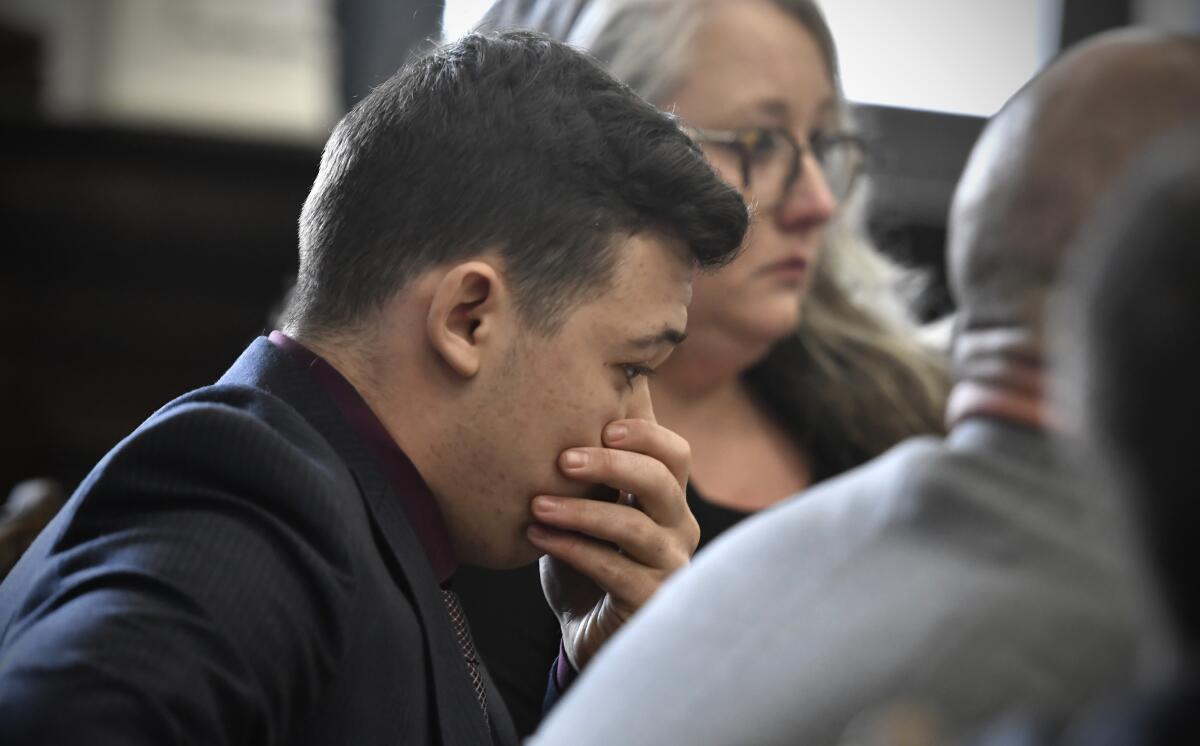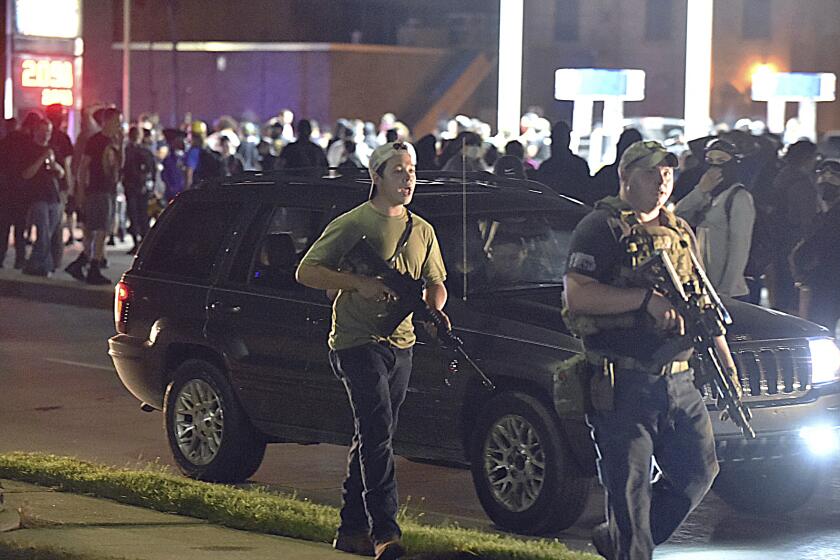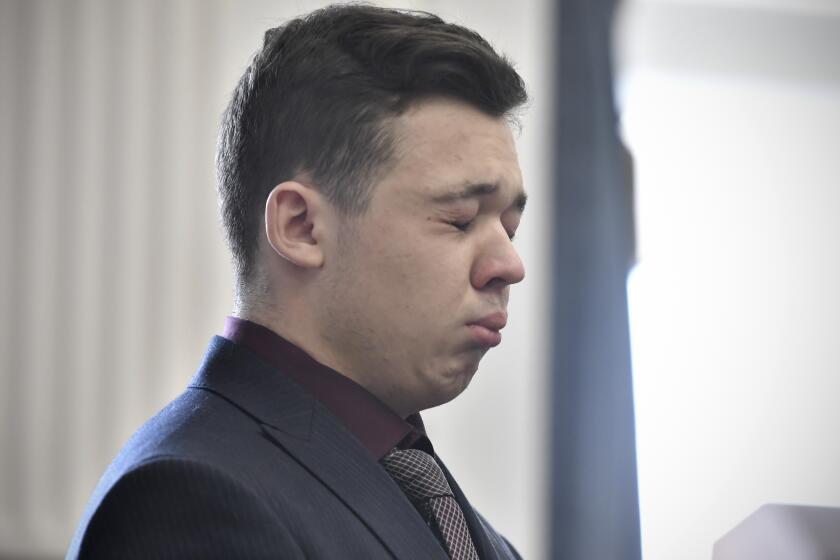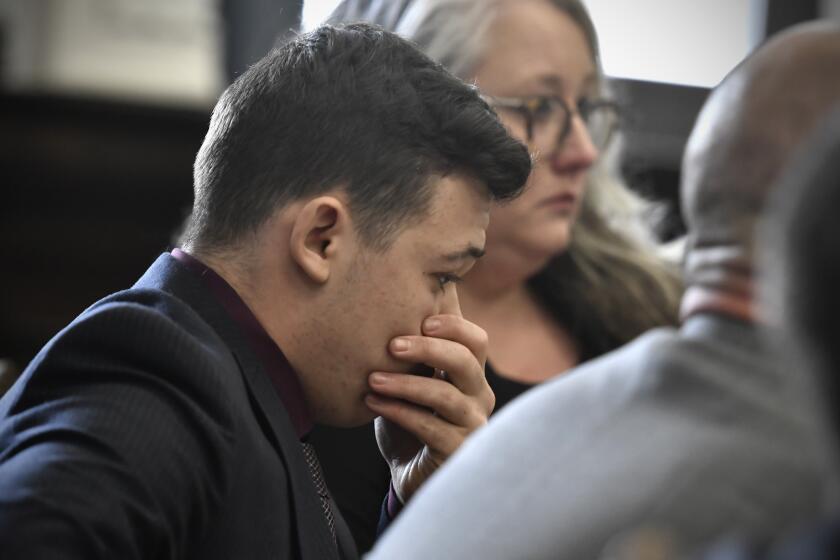Kyle Rittenhouse is found not guilty of all charges

- Share via
KENOSHA, Wis. — Kyle Rittenhouse, a teenager who shot and killed two men and wounded another as violent protests against police brutality engulfed Kenosha last year, was acquitted of all charges Friday in a closely watched case that has amplified bitter national debate over guns, vigilantism and law and order.
As the verdict was read for each count, the 18-year-old quivered, sobbed and — on the fifth and final “not guilty” — fell to his knees.
Rittenhouse, who was 17 at the time of the killings, faced charges including intentional homicide and reckless endangerment.
It took the jurors — seven women and five men — 3½ days to reach their decision inside a downtown Kenosha courthouse, a capstone to a two-week trial that reignited the charged politics of the Trump era.
The August 2020 shootings came amid the racial justice demonstrations that swept the nation following the killing of George Floyd by Minneapolis police.
Rittenhouse became an instant celebrity among right-wing groups, who called him a patriot and a “good guy with a gun.” They raised money — paying a large portion of his $2-million bail — and created mural images of him that flooded social media. Some supporters even donned new tattoos of the teenager.
Will the Kyle Rittenhouse verdict send the wrong message?
Then-President Trump refused to condemn the shootings and suggested Rittenhouse was acting in self-defense — the argument that Rittenhouse’s attorneys used to win his case.
Backers of Rittenhouse celebrated the verdict as a victory for the right of Americans to use firearms to protect themselves and their property.
“Self-defense is a God-given right, and Kyle defended himself,” said a statement by Dudley Brown, executive director of the National Foundation for Gun Rights in Loveland, Colo. “We hope that Kyle will now be allowed to live a free and prosperous life, and that all Americans will understand that the 2nd Amendment isn’t about hunting — it’s about the right to defend oneself from tyranny and lawless criminal actors.”
Trump also released a statement: “Congratulations to Kyle Rittenhouse for being found INNOCENT of all charges. It’s called being found NOT GUILTY — And by the way, if that’s not self-defense, nothing is!”
Many others had argued that Rittenhouse had courted violence by bringing an AR-style semiautomatic rifle to the Kenosha protests.
Though President Biden and other politicians said that the jury’s decision must be respected, some expressed concern that the verdict could send a dangerous message.
The acquittal of Kyle Rittenhouse on all counts sends a chilling message about the acceptability of vigilantism.
“I worry that some will portray Rittenhouse as a hero and that it will encourage vigilantism,” said Erwin Chemerinsky, dean of UC Berkeley School of Law. “We are at such a tense time in our society. I wish everyone would condemn what Rittenhouse did even though he was acquitted of a crime.
“A 17-year-old taking an AR-15 into a tense situation is a recipe for trouble,” he said.
Phil Haney, a 78-year-old Kenosha resident, one of several dozen people who gathered outside the courthouse for the verdicts, said he was left “speechless.”
“It now gives people the sense they can run around with rifles and shoot people in chaotic situations,” he said.
The jury was not considering whether Rittenhouse should have been on the streets of Kenosha with a rifle. Instead, it had to decide the much narrower question of whether he was acting in self-defense each time he pulled the trigger.
Prosecutors portrayed Rittenhouse as a calculating gunman — at times describing him as an “active shooter” — who roamed the streets of Kenosha looking to spark violence.
The only person who appears allowed to go on and live a full life is Kyle Rittenhouse, the 18-year-old who killed two people.
“You lose the right to self-defense when you’re the one who brought the gun, when you are the one creating the danger, when you’re the one provoking other people,” Deputy Dist. Atty. Thomas Binger told jurors.
But as the trial wore on, many legal experts came to believe that the prosecution would have trouble proving that Rittenhouse did not act in self-defense.
Video presented during the trial showed 36-year-old Joseph Rosenbaum chasing Rittenhouse through a parking lot before Rittenhouse shot him.
The second man Rittenhouse killed, 26-year-old Anthony Huber, could be seen swinging a skateboard at Rittenhouse’s head before attempting to grab his rifle in the middle of a street where hundreds of protesters gathered.
Moments later, Rittenhouse fired a single shot that hit Gaige Grosskreutz, then 26, in the arm.
A key moment in the trial came when Grosskreutz testified that he pointed a handgun at Rittenhouse and only then did Rittenhouse shoot him.
Legal experts said they were not surprised by the verdict.
“From just a legal standard, it was a straightforward self-defense case,” said Julius Kim, a criminal defense lawyer and former prosecutor in Wisconsin. “It wasn’t complicated.”
The demonstrations last year in Kenosha, a city of 100,000 people on the shore of Lake Michigan, came after Rusten Sheskey, a white Kenosha police officer, shot and paralyzed a Black man, Jacob Blake, after being called to an apartment complex for a domestic violence dispute.
Blake, who was holding a knife when he was struck by several bullets, later pleaded guilty to two misdemeanor counts of disorderly conduct. Sheskey was cleared in an investigation and remains in the department.
Federal law enforcement and National Guard troops were dispatched across the city for several weeks to deter protesters and protect property. Many small businesses were destroyed or damaged in the unrest.
In a high-stakes move by the defense, Rittenhouse took the stand to tell his side of what happened on the streets the day of the killings.
He testified that he showed up to protect property and offer medical aid to anybody who needed it.
“I didn’t do anything wrong,” Rittenhouse said. “I defended myself.”
His attorney Mark Richards said at a news conference after the verdicts that Rittenhouse “wishes none of this happened.”
The families of the two men who died expressed disappointment.
“There is no accountability for the person who murdered our son,” Huber’s parents, Karen Bloom and John Huber, said in a statement. “It sends the unacceptable message that armed civilians can show up in any town, incite violence, and then use the danger they have created to justify shooting people in the street.”
Despite the outcome of the case, Rob Kovach, president of Wisconsin Firearm Owners, an affiliate of the National Rifle Assn., said he was concerned about the state of gun rights.
“People going forward might not feel they’re able to exercise their right to protect their own safety because of the fear of a wrongful prosecution like this in the future,” he said.
He also bemoaned that Rittenhouse, despite the not-guilty verdict, would “always be seen as ‘the guy who shot those people in Wisconsin.’ ”
In anticipation of the verdict, Wisconsin Gov. Tony Evers placed 500 National Guard troops on standby in case of any protests in Kenosha.
Some residents said Friday they were ready to take to the streets against the verdicts in coming days. Aphrx Ashe, who marched in the city in the summer of 2020, predicted “lots of civil arrest.”
“It’s sad to see America hold on so tightly to white supremacy and so against Black lives,” said Ashe, who saw the verdicts in racial terms — confirmation that there is “a justice system for one people, and that’s people who are pale.”
Ashe, who is Black and transgender, said people like them never see justice “from the government.”
The streets remained calm Friday evening.
Shirley Thompson, 51, a Republican and Rittenhouse supporter, said she was worried that the divisions in her city that the trial exposed would only get deeper.
“I’m hoping I’m wrong about things,” she said. “I don’t want to go through what happened last year again.”
Lee reported from Kenosha and Kaleem from Los Angeles. Times staff writers Maura Dolan in San Francisco and Chris Megerian in Washington contributed to this report.
More to Read
Sign up for Essential California
The most important California stories and recommendations in your inbox every morning.
You may occasionally receive promotional content from the Los Angeles Times.















